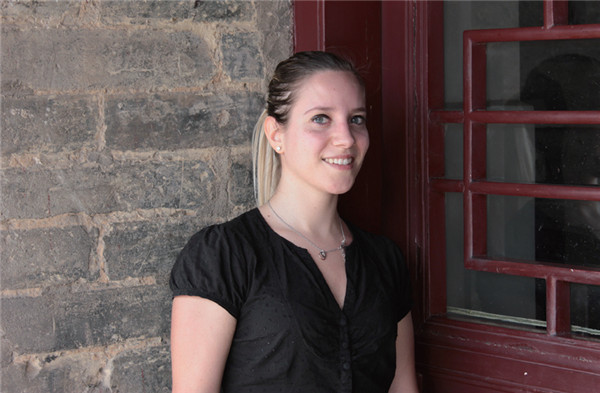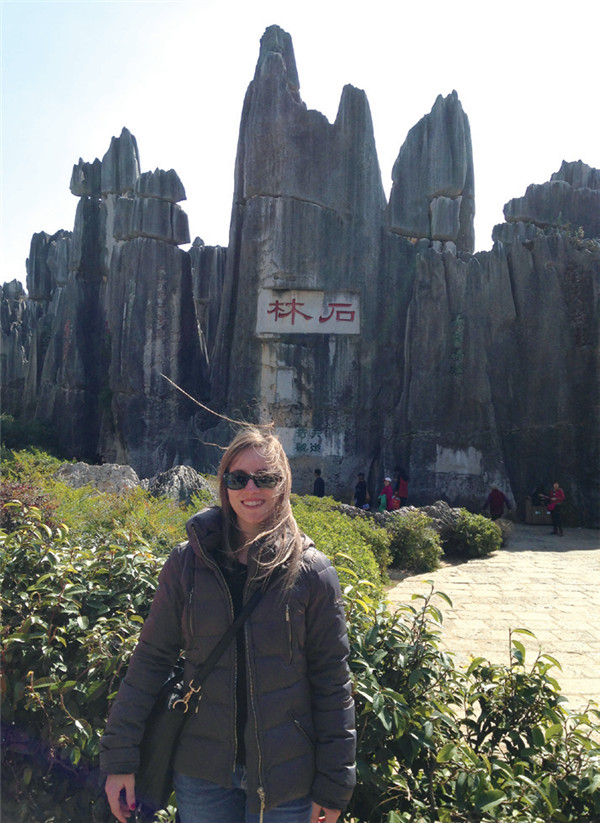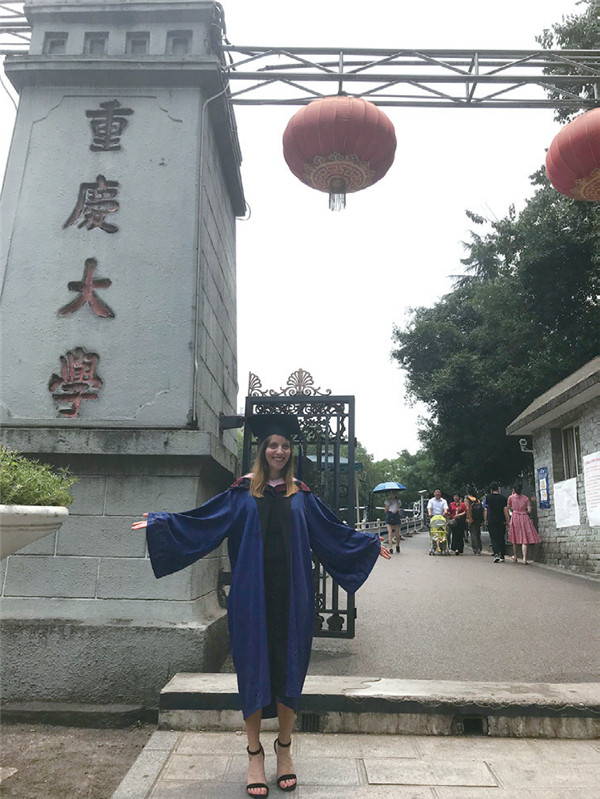我與中國的美麗邂逅
〔義大利〕 齊茉莉 重慶大學

自從我第一次登上前往東方的飛機,我就沉浸在想像之中,想像著十幾個小時後將會見到的新世界——重慶,在飛機上,我對重慶充滿了各種想像,對接下來的學習生活充滿了各種設想和期待……我第一次到重慶的奇幻之旅,距今已經有七年了。
當飛機落地,我一睜眼就到了重慶——山城、橋都、火鍋之城、棒棒城、擁有眾多摩天大樓的現代都市、擁有大量供你散步的公園景觀。這是一座擁有千種顏色與萬種美味的城市,紅色的辣椒,綠色的花椒,黑色的胡椒。這個城市給我的第一印象——“恐懼”,這種印象的衝擊,強得讓我眼睛淚水矇矓,心裏七上八下。我感到自己忽然被流放到了一個新的世界,一個與歐洲迥然不同的全新世界。中國,讓我的日常生活陷入了混亂。隨後,我對自己説:“Margherita,這是自我挑戰,只要堅持六個月,你就會習慣。”那段時間,我經常因為要閱讀滿是漢字的文章而頭疼;很多次因為食物有太多香料而肚子痛……這是一座很大的城市,而我時常害怕自己會迷路。
恐懼不久就被好奇心代替。我發現食物除了甜和鹹,還有麻辣味。那些我以為的馬鈴薯其實是蓮藕,紅豆原來可以做成非常甜的豆沙……我開始問自己關於中國的許多問題:為什麼現代和古代完美融合?為什麼匆忙和放鬆能夠保持平衡?為什麼城市即便那麼大,我也能感到受歡迎和保護?為什麼所有事物都在不斷地往前發展和更新轉變?通過大學生活和聚餐時跟中國人的交談,我獲得了一些答案。另外,我在旅行中參觀的很多城市(北京、南京、貴陽、蘇州、杭州、上海、深圳等),使我了解了中國社會的多樣性:每個地區的食物、態度、生活風格和語言都有著明顯的差異。書本讓我從知識方面了解中國,而旅行讓我驗證了我的認知。我不再用西方人的眼光來觀察中國,而是學著用中國人的眼光來看待問題。我明白,在中國的新生活正在改變我,甚至使我得到提升。
好奇心很快變成了融合。我感到自己與重慶相處得非常和諧:車水馬龍的噪聲成為悅耳的聲音,火鍋刺鼻的麻辣成為最美的味道,可有可無的小碗白米飯成為飲食中必不可少的一部分,一些陌生的地點成為很熟悉的地方,無法聽得懂的重慶話聲調成為曲調。我的家就在那兒:一扇可以欣賞夜間高樓陰影的窗戶,一張可以做夢的睡床,一個可以烹飪餃子的廚房。這些簡單的生活瑣事使我幸福。我想要繼續留在中國的願望與日俱增,所以六個月的留學生活變成了四年半。

齊茉莉在昆明石林
重慶俘獲了我。我的笑容比以前更燦爛了,我的內心比以前更柔軟了,我變得前所未有的堅強。中國的一切讓我情緒高漲,恍惚間,我甚至懷疑自己不值得擁有如此美好的生活。我原有的認知由此慢慢改變,之後也收穫了一些新習慣:用好喝的熱茶代替了可樂,知道饅頭比麵包軟和,筷子比叉子方便……在我坐飛機回義大利的前幾天,我最後一次轉了轉在重慶時常會去的地方,吃了最喜歡的小吃,和我居住了四年多的家合影留念。我最害怕的是:遺忘所經歷的一切。不過,我明白時間不會消除對這段經歷的記憶,因為我的大腦和內心,將永遠為它們保留一個非常特殊的位置。

齊茉莉在重慶大學
儘管我現在人在義大利,但我經常感覺自己手裏緊緊握著一根細線,連接了我和數千公里以外的中國。我不得不承認:我與中國,有著深深的羈絆和牽掛。對別人而言,這或許是不可思議的吧!
而此刻,我一邊寫著這篇文章,一邊喝著熱水,我意識到我不僅僅是義大利的Margherita,我也是中國的茉莉。七年前的那趟去往中國重慶的航班,帶我去了一個永遠會改變我身份的地方——重慶。這就是我與中國重慶的美麗邂逅。
My Beautiful Encounter with China
〔Italy〕 Cicione Margherita, Chongqing University
Since the minute I was on board on my first flight to the East, I had been imagining how Chongqing, the new world which I would soon meet a dozen hours later, looked like. I looked forward with excitation to the life expanding before me. It has been seven years since my first amazing trip to the city Chongqing.
When I finally landed in Chongqing, I saw an amazing city with diverse charms. It was a city of mountains, a city of bridges, a city of hot pots and a city of Bangbang (long and strong sticks to help carry packages). It was also a modern city with a great number of skyscrapers and leisure parks. It had thousands of colors and millions of delicious specialities. For example, for peppers only, there were red, green and even black peppers. The first impression Chongqing had on me was “fear”. I was worried and unsettled almost into tears, as if I was exiled to a new world, nothing similar to Europe. China made my daily life into chaos. I had a deep breath and told myself, “Margherita, this is a self challenge. Believe yourself. You will soon get used to China after only six months.” I felt headache when reading articles in Chinese and my stomach also ached when eating food with too much spices. Chongqing is a very big city and I was often fearful that I would get lost.
Fear was soon replaced by curiosity. I found that there were spicy and hot delicacies besides salty and sweet food. The potatoes I found in the dishes turned out to be lotus roots and red beans could be made into sweet paste. I started to ask myself many questions about China: Why ancient and modern China can be perfectly merged? Why people can keep perfect balance between haste and ease? Why I feel welcomed and protected even in such a big city? Why every thing is moving forward, changing and evolving? I found clues to some of the questions in my university life and in talking with Chinese people during some get-togethers. I travelled to a number of cities, such as Beijing, Nanjing, Guiyang, Suzhou, Hangzhou, Shanghai and Shenzhen. I learned the diversity of Chinese cities in these trips. There were distinct differences in food, attitude, life style and language in different areas in China. I began to know more about China from books and then verified the knowledge when travelling. I stopped looking at China from a Westerner’s perspective. Instead I tried to look at China with eyes of Chinese. I knew I was being changed or even transformed by the new life in China.
Curiosity soon turned into merging. I felt at ease with Chongqing very soon. The hustle and bustle of life became pleasant music, the irritating spicy hot-pot became delicious, small-bowl rice which had previously been nothing to me now became a must, some strange places became familiar and the Chongqing tone which had been hard to understand now became pleasing tune. My home was there, with a window from which I enjoyed shadows of skyscrapers at night, a bed with sweet dreams and a kitchen where I cooked dumplings. All simple trifles in daily life made me happy. I wish I could stay in China longer. Therefore I extended my 6-month studying to four and a half years.
I became a captive of Chongqing. I smiled brighter, and I grew softer and stronger. Life in China motivated me into high spirits. Sometimes I asked myself if I was worthy of such a beautify life. My previous understanding of China slowly changed and I grew some new habits now, for example, I drank nice hot tea instead of cocola now, I loved softer Mantou (Chinese steamed bread) more than bread, and I used chopsticks easier than forks. Several days before my flight back to Italy, I visited for the last time places I frequented in Chongqing, ate my favorite specialities and took a picture with the home which I had stayed for more than four years. I feared time would blur my memories about China. However, I believed that time could never erase the memories because my mind and heart would keep a special place for those memories forever.
Now though back in Italy, I often felt I was still connected to China thousand of miles away with a thin string tight in my hands. I had to admit I was deeply attached to China. Somebody may think this was quite incredible, however it was so true to me.
Now I am writing this article while drinking hot water (a habit of Chinese people), and I realize that I am not only Margherita in Italy, but also Moli (meaning Jasmine in Chinese) in China. The flight taking me to Chongqing seven years ago changed my identity and also transformed my life. This is my beautiful encounter with Chongqing, China.



